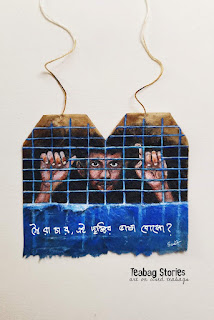Single Point Demand. Bangladesh quota reform movement ,2024 @ Generation 'z'.
What started as a student movement has rapidly evolved into a nationwide call for reform, drawing widespread attention and prompting significant government response.
The Present Crisis
However, the present crisis began when on June 5, 2024, following the filing of a writ petition by a group of relatives of the war veterans,[8] the High Court of Bangladesh, perceived to be supportive of the current PM Sheikh Hasina, reinstated the controversial quota system terming the government’s decision to scrap the quotas in 2018 as “unconstitutional, illegal, and ineffective.” Immediately student-led protests, initially peaceful, erupted across the country.
The protests that began in early July were modest in size but consistently maintained, occasionally encountering violence from individuals reportedly aligned with the ruling Awami League (AL) and its student faction Bangladesh Chhatra League (BCL).
However, during the same time, a significant event occurred on July 7, when a Bangladeshi investigative journalist revealed that “for more than 12 years, questions for the Bangladesh Civil Service (BCS) (first-class government jobs) and other government job exams have been consistently compromised with regular leakage of BCS exam questions.” This further incited the student community.
But the tension intensified after Hasina made a controversial remark on July 14 labelling the protesters as Razakars, a term considered to be derogatory in the country, referring to people who collaborated with the Pakistani military during Bangladesh’s struggle for liberation. In response, the protesters adopted the term as their own in a sarcastic manner in their demonstrations.
All these events led to the worsening of the situation, culminating in several deaths and prompting protesters to call for a nationwide shutdown. Ironically not only public but also students from private universities joined the movement this time which is a significant move given the latter’s privileged status.
To manage the volatile situation, the government was compelled to impose a curfew and the Armed Forces were deployed around the country in aid of the civil authority. On July 18, the Bangladesh government suspended mobile internet services due to escalating violence throughout the country. Reports indicate that clashes between law enforcement agencies and protesters led to nearly 200 deaths, with thousands more reportedly injured. Finally, on July 21, the Supreme
Court scrapped the High Court judgment and declared that 93 percent of jobs in civil service would be merit-based; while the quota for freedom fighters or their children was reduced to 5 percent from 30 percent. One percent quota has been reserved for ethnic minorities and another one percent for persons with disability and people of third gender. However, the ruling also stated that the government would have complete discretion to modify these quotas in the future as necessary. The government endorsed this recommendation and officially notified the public within two days. But the agitating students made a nine-point demand including the banning of BCL, resignation/removal of Quader, public apology from the PM for the mass killing, investigation into the excessive use of force by law enforcement agencies, compensation to the families of the death/injured, releasing all detained students and removing all government cases intended to intimidate them, etc.
This illustrates how the protests have evolved beyond merely calling for the cancellation of the quota system.
Uncovering the Hidden Grievances
In reality, the anti-quota protests gained their strength from a deep-seated economic and political malaise simmering in Bangladesh for the last few years. Experts have opined that “The quota issue is the tip of the iceberg of economic and political discontent that lies underneath the surface.” The perceived injustice of guaranteeing jobs to the grandchildren of freedom fighters—viewed by many as a concession to AL loyalists—is compounded by rising inflation, a struggling job market for university graduates, and instances of blatant corruption that disproportionately benefit government officials. This economic downturn has added to the frustration regarding the job quota system. In addition, the current government, which assumed power for the fourth consecutive time at the start of this year, is accused of suppressing dissent, limiting freedoms and democratic processes while exhibiting autocratic tendencies. Moreover, the government’s heavy-handed approach while dealing with the protesters has drawn widespread criticism from the general public.
Bangladesh is facing a unique situation at present. The government announced a nationwide day of mourning on 30 June to honour those who lost their lives in the recent violence.[33] Reports also surfaced in the media that the coordinators of the demonstrators pushing for quota reforms have announced the suspension of their protests. This decision apparently came in response to the current situation in the country and because their main demand has been addressed by the government.
However, other coordinators and co-coordinators have stated that they will continue the movement until their nine-point demands are met, asserting further that the withdrawal statement of their fellow coordinators was extracted under pressure/duress.Given this scenario, it is unlikely that the situation will stay calm and peaceful for an extended period. However, internet services have been restored in the country and the curfew has been relaxed .
Tension gripped Bangladesh afresh on Saturday , August 3 after leaders of the student movement refused Prime Minister Sheikh Hasina's invitation for talks while protesters laid siege on major streets in the capital, days after more than 200 people died in anti-quota protests.
However, coordinators of the Anti-Discrimination Student Movement said on Friday that they had no plan to hold talks with the government, and overnight, they called a nationwide street protest and "all-out non-cooperation" or civil disobedience campaign.
Single-point demand
Tens of thousands of people from all walks of life joined a rally at Central Shaheed Minar in the capital today to protest the killings and mass arrests over quota protests as sporadic clashes were reported in some parts of the country.
People in droves from different parts of Dhaka thronged the Shaheed Minar in the afternoon following a call by the Anti-Discriminatory Student Movement who are spearheading a protest against the government's heavy-handed response in policing a protest over reforming the quota system in government jobs.
In the rally, the organisers of the students' movement announced a single-point demand for the resignation of Prime Minister Sheikh Hasina and her cabinet members. They also rejected a talks proposal by the PM.
"We are here with a one-point demand. We seek to ensure people's safety and justice … ," said Nahid Islam, one of the key organisers.
Referring to the PM's call for dialogue, he said, "We are demanding the resignation of Sheikh Hasina. Her resignation is not enough;she has to be brought to justice for all the killings and abductions. Not only Sheikh Hasina, but also the entire cabinet has to resign."
Nahid said they want to develop a political system where autocracy would never return. He urged the people to join the "student-citizen mass uprising" and organise in every locality.
He said the Anti-Discrimination Student Movement will soon forge an alliance of citizens, student organisations, and all professionals.
"Upon consulting all, we will unveil a future national framework. We are urging people to join the all-out non-cooperation. We will not cooperate with the government in any way," he said.
The UN, Amnesty International and Human Rights Watch also called out the excesses by law enforcers that led to the killings of so many people, who were mostly unarmed.
The history of quotas in Bangladesh
After partition, in 1947, quota provisions for public service recruitment were established through an executive order, which were later solidified under the 1956 constitution
Quota reform protesters hold a demonstration near the Raju Memorial Sculpture at Dhaka University demanding the prime minister withdraw her comment on their movement on Monday, July 15, 2024.
The quota system once again entered the public discussion on June 5, when the High Court nullified the government's 2018 notification that abolished all quotas in first- and second-class government jobs.
The government had abolished all quotas in government jobs for first and second-class positions for a solid five years. Starting from October 2018 until May of the following year, all recruitment was conducted without any quotas.
As a result of the cancellation of the 2018 notice, the quota for freedom fighters in first and second-class positions (National Salary Grades 9 to 13) was reinstated to 30%.
Quota system in the Pakistan period
Following the partition of 1947, the newly established Pakistan introduced the Civil Service of Pakistan (CSP) along with other central and provincial services.
After partition, in 1947, quota provisions for public service recruitment were established through an executive order, which were later solidified under the 1956 constitution.One of the earliest quota provisions during this period was for the Central Superior Services (CSS), responsible for recruiting into key positions such as tax and customs, railways, and foreign service roles. Initially, only 20% of these positions were allocated based on merit, while the remaining 80 % were reserved for candidates from various provinces of Pakistan.
The youth are screaming. Will the government listen?
East Pakistan, being the largest and most populous province, was allocated a 40% quota. Punjab and Bhawalpur were allotted 23%, Sind, Khairpur, and North‐West Provinces 2%, and Frontier, Tribal Areas, Baluchistan, Azad Kashmir and Kashmir Refugees 15%.
Quota system in Bangladesh
The quota system itself was introduced in 1972 by Bangabandhu Sheikh Mujibur Rahman, in a country ravaged by war, as a recognition of its freedom fighters.The following year, a movement began demanding the cancellation of this system, and it has continued on and off ever since.Various governments have reformed, modified, and changed the quota system at different times instead of permanently abolishing it.
2018 quota reform
As of 2018, there was a 56% quota in government jobs in the country.Of this, 30% of seats were reserved for descendants of freedom fighters, 10% for women, 10% for residents of backward districts, 5% for people from minority groups, and 1% for people with disabilities.That year, massive protests were held at various educational institutions across the country demanding quota reforms.The agitating students demanded that the quota system be reformed and reduced from 56% to 10%.The government, in the wake of the student movement, eliminated all forms of quotas to ensure the recruitment of meritorious and qualified individuals for positions in grades 9 to 13 (formerly known as first and second-class jobs) in government employment.However, quotas for third and fourth-class posts (grades 14 to 20) remained in effect.If no candidate from the relevant quota is found, those positions are filled from the merit list of general candidates -- a decision taken by Prime Minister Sheikh Hasina on October 3, 2018.The next day, the government issued a circular abolishing all the quotas in public service in response to the protests by public university students and job seekers.
What is in the constitution
Article 29 (1) of Part III of the Constitution of Bangladesh states that there shall be equality of opportunity for all citizens in the employment or promotion of public works.Clause (a) of Article 29 (3) says: “Nothing in this article shall prevent the state from making special provision in favour of any backward section of citizens for the purpose of securing their adequate representation in the service of the republic.”
The country is mine, the responsibility is mine.
I am indebted and accountable to my country and not to any individual or group. It is my duty to do good work for the country.
#peacefulprotest is #HUMANRIGHTS
References
[1] https://thediplomat.com/2024/07/historys-key-role-in-deadly-student-protests-in-bangladesh/[2] https://www.crisisgroup.org/asia/south-asia/bangladesh/bangladesh-edge-after-crushing-quota-protests[3] https://en.prothomalo.com/bangladesh/34ubjzsg30[4] https://www.tbsnews.net/bangladesh/explainer-why-areU-students-protesting-quota-system-888911[5] https://indianexpress.com/article/opinion/columns/bangladesh-quota-system-protests-deep-rooted-political-divides-9466704/[6] https://indianexpress.com/article/opinion/columns/bangladesh-quota-system-protests-deep-rooted-political-divides-9466704/[7] https://www.dhakatribune.com/bangladesh/352566/the-history-of-quotas-in-bangladesh[8] https://www.amnesty.org/en/latest/news/2024/07/what-is-happening-at-the-quota-reform-protests-in-bangladesh/#:~:text=Following%20the%20filing%20of%20a,30%20percent%20to%205%20percent.[9] https://thediplomat.com/2024/07/the-quota-reform-protest-in-bangladesh-is-much-more-than-it-seems/[10] https://www.usip.org/publications/2024/07/whats-behind-bangladeshs-student-protests[11] https://www.soas.ac.uk/about/blog/2024-uprising-bangladesh-more-just-quota-reform[12] https://www.thedailystar.net/opinion/views/news/slogan-lost-translation-3658501[13] https://www.tbsnews.net/bangladesh/politics/bnp-urges-partymen-public-join-tomorrows-complete-shutdown-programme-901636[14] https://www.dhakatribune.com/bangladesh/352268/chhatra-dal-formally-joins-movement-urges[15] https://www.hindustantimes.com/world-news/bangladesh-student-protests-internet-restored-in-country-after-10-days-101722163537320.html[16] https://www.isas.nus.edu.sg/papers/quota-protests-in-bangladesh-causes-and-consequences/[17] https://www.thedailystar.net/news/bangladesh/news/sc-verdict-govt-jobs-93pc-merit-7pc-quota-3660211[18] https://www.thedailystar.net/news/bangladesh/news/sc-verdict-govt-jobs-93pc-merit-7pc-quota-3660211[19] https://www.isas.nus.edu.sg/papers/quota-protests-in-bangladesh-causes-and-consequences/[20] https://www.isas.nus.edu.sg/papers/quota-protests-in-bangladesh-causes-and-consequences/[21] https://www.aljazeera.com/opinions/2024/7/23/bangladesh-protests-are-no-longer-about-the-quota-system[22] https://www.isas.nus.edu.sg/papers/quota-protests-in-bangladesh-causes-and-consequences/[23] https://www.usip.org/publications/2024/07/whats-behind-bangladeshs-student-protests[24] https://www.usip.org/publications/2024/07/whats-behind-bangladeshs-student-protests[25] https://www.thedailystar.net/business/news/the-cost-crisis-who-will-bear-it-3664331[26] https://www.aljazeera.com/news/2024/7/23/bangladesh-curfews-internet-blackout-batter-economy-amid-quota-protests[27] https://www.thedailystar.net/business/news/shutdown-cost-the-economy-10-billion-ficci-3664066[28] https://www.thedailystar.net/business/news/the-cost-crisis-who-will-bear-it-3664331[29] https://www.thedailystar.net/opinion/views/news/man-made-disaster-and-the-major-economic-losses-it-caused-3661016[30] https://www.thedailystar.net/opinion/views/news/man-made-disaster-and-the-major-economic-losses-it-caused-3661016[31] https://www.thedailystar.net/opinion/views/news/man-made-disaster-and-the-major-economic-losses-it-caused-3661016[32] https://www.thedailystar.net/opinion/views/news/man-made-disaster-and-the-major-economic-losses-it-caused-3661016[33] https://www.thedailystar.net/news/bangladesh/news/nationwide-mourning-today-3664971[34] https://www.dhakatribune.com/bangladesh/dhaka/352974/quota-reform-movement-coordinators-announce-end-of[35] https://www.dhakatribune.com/bangladesh/dhaka/352974/quota-reform-movement-coordinators-announce-end-of[36] https://www.dhakatribune.com/bangladesh/politics/353068/14-party-alliance-decides-to-ban-jamaat-shibir[37] https://www.usip.org/publications/2024/07/whats-behind-bangladeshs-student-protests
(The paper does not necessarily represent the organisational stance... More >>
Image Source: https://upload.wikimedia.org/wikipedia/commons/b/ba/4.Bangladesh_quota_reform_movement_2024.jpg
https://m.economictimes.com/news/international/world-news/tension-mounts-afresh-in-bangladesh-as-student-movement-leaders-refuse-pm-hasinas-call-for-dialogue/articleshow/112247828.cms https://www.thedailystar.net/news/bangladesh/news/protests-rock-the-country-3668846?amp=


























Comments